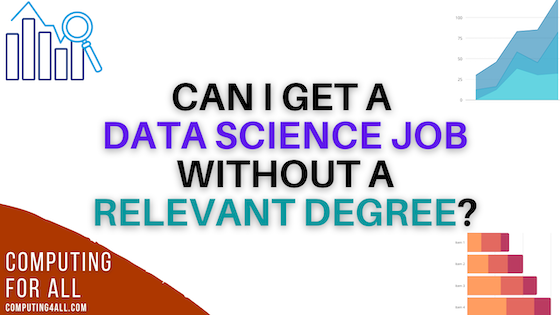
Can I get a data science job without a relevant degree?
It is becoming more common for Data Science jobs to require applicants at least a bachelor’s degree in one of the core subjects that make up data science: computer science, statistics, or mathematics. It is certainly possible to learn the skills necessary for a data science position without a relevant degree. However, it isn’t easy to compete with applicants with relevant data science educational backgrounds from universities.
Contents
Can I get a job in data science without a relevant degree?
Getting a data science job without a relevant degree depends on the position an applicant is targeting. It is common to expect a relevant bachelor’s or master’s degree for a data science position like a machine learning engineer. Many projects might require sophisticated research and development, for which project managers will require a relevant Ph.D. degree or ample experience in the field.
For entry-level data scientists in big companies, it is common to expect a bachelor’s degree in computer science, statistics, or mathematics. Some smaller companies may only require tool-based skills for their data science positions, such as data analysts. They often mention specific skills of Python, scikit-learn, Pandas, or sometimes R, instead of requiring a relevant degree.
Is a data science degree recommended before applying for a job?
With the increasing demand for skilled and trained individuals in data science, the competition for available positions can be fierce. Even if a person has a bachelor’s degree, securing a position can sometimes be difficult due to a lack of experience or knowledge in the Data Science area. For this reason, obtaining a relevant degree is almost always recommended for anyone interested in securing a data science job in the future.
If someone already obtained a bachelor’s degree, the logical question is whether one needs to further their education to secure a Data Science job. The answer is, it depends on what bachelor’s degree the applicant already has. 
Suppose someone has a computer science, statistics, or mathematics bachelor’s degree. In that case, it might be plausible to gain data science skills quickly by studying online resources or completing a few online courses.
Most engineering and science domains already cover basic statistics and mathematics at the bachelor’s level. With any engineering and science bachelor’s degree, one might already have some programming expertise. The programming skill is beneficial for gaining data science expertise. Therefore, I would say that people with engineering and science bachelor’s degrees can gain data science expertise by completing a few online courses such as machine learning, data mining, and information visualization.
It has become common to get a data science master’s degree if someone already has a bachelor’s degree from any discipline. If you have a bachelor’s degree in any field and looking into the possibility of jobs in data science, consider a master’s degree in data science to make your application more competitive.
How to learn data science without a relevant degree
It is essential to realize that the demand for a data science workforce does not necessarily imply that a person should get a four-year data science degree. There are other methods of acquiring experience in the field, which are less time-consuming and cost-effective.
- Concentrations: Some universities offer concentration programs for current students. In a concentration, students choose several elective courses relevant to data science to receive the concentration with their bachelor’s degree. A concentration is a convenient way to include data science experience in the resume during bachelor’s studies.
- Certificate programs: Some universities have a few month-long data science certificate programs. Many of these certificate programs are online, and professionals worldwide can participate in these programs.
- Free and low-cost online resources: For those not currently in the university and who do not want to go back for a higher degree, other data science learning resources include books and courses in online platforms such as Coursera and Udemy. We also have an online (free) data science course, which we are constantly developing.
Regardless of the sources, individuals will need to invest time and effort into gaining the necessary data science skills. The most important thing in data science is the basic understanding of the theories.
Data science skills are not some expertise built on top of plug-and-play tools. Although many libraries have been developed to make the lives of data scientists easier, the practitioners require the fundamental theoretical knowledge behind the algorithms to build an analytic framework and analyze real-world data.
Another essential thing to remember is always to be ready to adapt to changes in the tools and technologies.
Can I learn Data Science on my own?
Yes, you can, but how quickly you will learn data science on your own depends on your existing expertise. Time to self-study data science relies on knowledge about programming, basic statistics, and mathematics.
With ample resources available on the internet, learning data science on your own is no more a fantasy. You can simply start from our data science course — Introduction to Data Science. In this free course, I focus on explaining the fundamental theories and relevant Python implementations. I do not assume any specific background for this course. As a result, the course should be alright for anyone with some basic programming knowledge.
A few of my previous articles might shed some light on topics of your interest in the data science domain.
Conclusion
A data scientist requires knowledge of machine learning, deep learning, statistics, mathematics, and relevant programming tools to thrive in the industry. Self-studying the topics is plausible, but the competition in the industry is increasing rapidly. Even existing software engineers, business analysts, and system experts in many industries are now gaining data science expertise to maintain a competitive edge for the upcoming years. Therefore, getting a data science job in the coming years is not going to be easier. Studying the comparatively new technologies (e.g., PyTorch, TensorFlow) and gaining expertise on new algorithms will provide a competitive advantage in the upcoming years.


1 Comment
Can I learn data science with you.